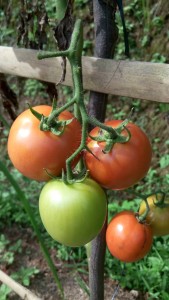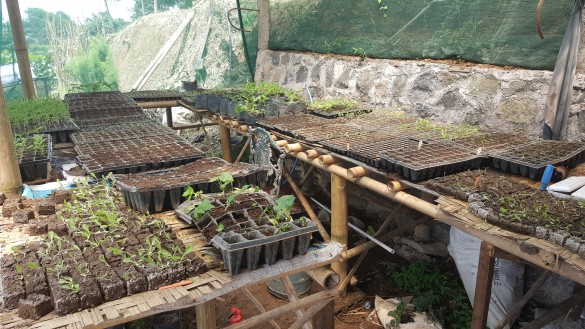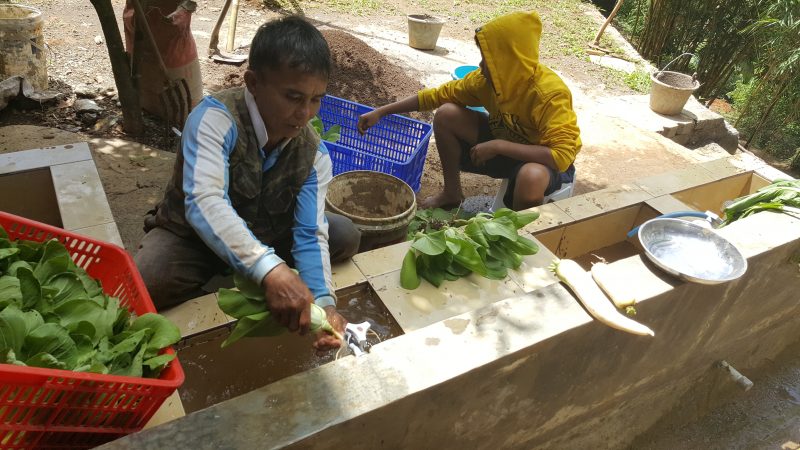There are three key elements to consider when making the choice of whether to buy organic food in Indonesia: health, taste and price.
Health: As far as the lesser prevalence of pesticides, synthetic fertilizers, sewage sludge and genetically modified organisms is concerned, the answer is definitely that organic food is healthier than conventional agro-products, advocates will say.
Taste: Taste is important but generally noticeable only once the produce has been processed. The difference between industry-baked white sandwich bread and naturally fermented wholemeal loaves a clear example. Well, obviously not everyone agrees.
Price: Unfortunately, organic food is pricier than the conventional variety.
How then can consumers be sure that the organic label attached to the product is verifiably correct to justify a higher price?
Indonesia’s organic regulations stipulate that fruits and vegetables are grown without the use of pesticides, synthetic fertilizers, genetically modified organisms or ionising radiation. Animals that produce meat, eggs and dairy products are not to be given antibiotics or growth hormones.
To be certified, the Indonesian system moreover requires that the soil of organic farms is tested every year for residue of pesticides. And only when the soil has been declared pesticide-free for three consecutive years are the products allowed to be labelled ‘organic’.
Unfortunately, short of growing the veggies yourself, it’s difficult to feel totally confident about the source. Wrongly labelled items do occur fairly often – by one estimate not more than one in five of the products offered as organic in the local supermarkets deserves this label. In many cases, the label, rather than an official certificate, is nothing more than the word ‘organic’ on the price tag.
A convenient shortcut to solving the problem of the true organic classification of fruits and vegetables is offered by the e-commerce company Kecipir.
Established on Earth Day, April 22, 2013, Kecipir offers organic produce from its own supervised growers. Not only do they bring fresh in-season organic produce to consumers in Jakarta and surrounding cities – Tangerang, Bekasi and Bogor – they have also set a developmental goal.

Kecipir assists farmers in achieving certified, organic standards through training programmes in organic tilling, while also providing a market at guaranteed prices for the produce. The company has thus positioned itself as buyer at farm gate and as retailer, while taking care of in-between steps of transporting and sorting of the products.
Farmers in Kecipir’s orbit are either fully certified organic or on their way to being certified.
Three types of organic labels are used in its system:
- A – Certified organic in accordance with the Indonesian certification system described above.
- B – Uncertified but close to certified status. For example, where the residue free status of the soil is more than two years but less than three.
- C – Grown pesticide-free but with traces of pesticides remaining in the soil.
The C-label is used as encouragement. Farmers that have started on the organic path are given a small price incentive, although true certification is still a few years off.
Kecipir claims to visit and check its farmers frequently.
Currently, some 30 farmers with a total of 100 hectares are involved in the supply chain and the size of the individual farms ranges from 0.5 to 30 hectares. The smaller ones are surrounded by a buffer zone.
Farmers inform Kecipir about the type and volumes of products that will be available the following week. Products are harvested between 3 pm and 8 pm and are transported, sorted and packaged that same night. The next morning, the products are ready for sale to consumers. Consumer thus receive their veggies within less than 24 hours after harvesting.
Kecipir is an e-commerce retailer. The products are not available in established shops but exclusively sold through agents listed on its website. The number of agents in Greater Jakarta is currently around 150.
Consumers who are members of the Kecipir e-commerce system order from the list of available foods on the company’s website and collect their orders on the specified day. People in West Jakarta and Tangerang can collect on Mondays and Thursdays. Those in South, Central and East Jakarta, as well as Bekasi, can collect on Tuesdays and Fridays.
When registering in the system, consumers are assigned an agent, usually the one closest to their home, but changing agents is possible. Orders can be picked up between 9 am and 5 pm from their respective agents. Payments are made by bank transfer, credit or debit card, cash-on-delivery or by Kecipir Green Cash, which is essentially a card you can top up with money to make purchases on the site.
Kecipir is currently only in Bahasa Indonesia, but an English version will be available early this year. That said, even with a limited knowledge of Bahasa Indonesia, one can still easily understand the process of ordering and collecting the goods (much like using apps like Go-Jek).
The questions remain. Why bother with all of this? Is it not easier to just buy the organic products from the appropriate shelf in the many supermarkets?
The main reason for concerned foodies is about the products’ genuine organic origins.
Organic labelling is not always clear, not in Indonesia and not abroad. Mislabelling does occur. But a visual inspection of the organic product will show spots, holes, dents and non-uniform shapes and colours.
Washing is therefore recommended, not to get rid of the insecticides but to oust the occasional snail or worm. And once sautéed or part of a salad, it is the taste that is important, not the uniformity of shape and colour.
Give it a try. Buying organics from Kecipir will not only be a healthy personal choice but will also support environmental sustainability by reducing air and water pollution, albeit on a limited scale. But then, support of environmental sustainability has to start sooner or later. And in this case, sooner is better.
For more information, please visit www.kecipir.com.




